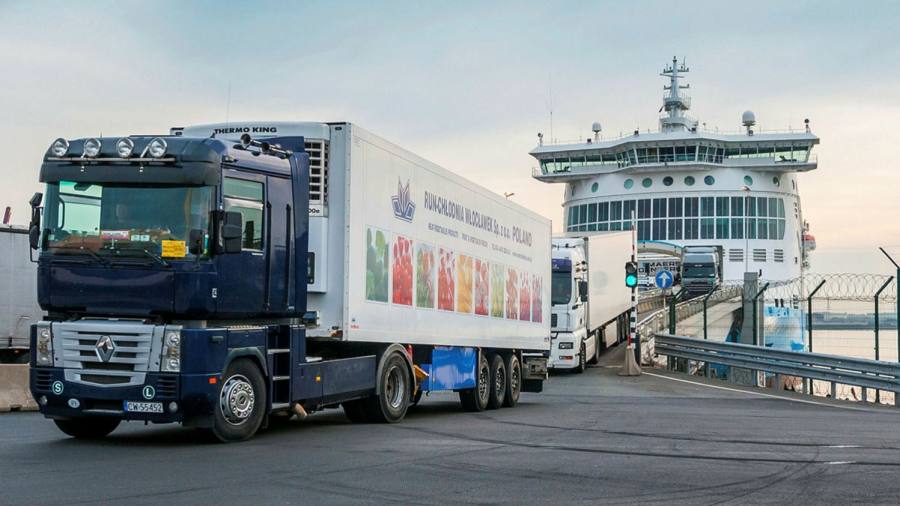Ferry operators have warned that without government support they may have to close some sea routes carrying essential goods like food and medicines into the UK because of the hit from coronavirus.
The lockdown has led to a collapse in traffic, blowing a hole in the business model of operating the large roll-on/roll-off ships for both car passengers and freight. These services carry a large amount of the imports from mainland Europe and Ireland.
At least one ferry operator has requested direct financial assistance from the British government, rather than tapping any of its emergency loan schemes to keep the vital services running. The UK imports almost half its food and is heavily reliant on sea routes.
Denmark’s DFDS, which has already cancelled some ferry sailings, has demanded that the UK “share in the losses” of operating certain routes.
“We don’t want to borrow money to cover losses,” chief executive Torben Carlsen told the Financial Times. “They can write us a cheque, they can buy some of our . . . passenger or freight capacity.”
“The routes from Dover are broken right now because they’re normally depending on both freight and passengers,” he added. “Somebody needs to make sure that model works in this period so we can continue carrying all the freight”.
Rival P&O, which transports about 15 per cent of all goods into and out of the UK, is set for a £150m bailout from the government but it declined to give any further details and whether that included loans.
The company is pulling together an overall rescue package worth £257.5m which will also include cost savings, deferred pension payments and a possible contribution from its Dubai-based owner DP World.
Bob Sanguinetti, chief executive of the UK Chamber of Shipping, warned that some companies were considering taking vessels out of service. “We are being told that it is fast becoming cheaper to lay ships up than to keep them running at a loss. This will put at risk our vital supply and essential logistics lines — the life blood of this nation.”
Ireland’s government this week announced that it would provide up to €15m to ensure that critical sea routes remained operational.
Other ferry operators are also looking to the UK government for help. The French parent group of Brittany Ferries is tapping Paris for loan guarantees but is also seeking some financial help from the British authorities “to cover [its] costs in running services in freight-only mode”.
It said: “We’re not seeking a bailout from UK plc, just a little assistance while we bring in essentials during the immediacy of the crisis. We need to break even, to keep lines open that we would otherwise have to make a commercial decision to close.”
Meanwhile, Stena Line, which this week furloughed 600 of its UK staff and made 150 redundant, has applied for government loan guarantees but said it had yet to receive confirmation that it had qualified.
Coronavirus business update

How is coronavirus taking its toll on markets, business, and our everyday lives and workplaces? Stay briefed with our coronavirus newsletter.
The Department for Transport said it recognised “how challenging this period is for the transport sector” and urged all companies to tap the various government schemes. “We will continue to directly engage haulage and maritime companies and associations to tackle these challenges.”
The government has offered emergency financing to businesses through a number of schemes, including guaranteed loans and an offer to cover up to 80 per cent of employees’ wages, but a number of industries have warned that many companies are still struggling to access them and are running low on cash.
The Road Haulage Association has told the FT that almost half of the UK’s lorries are parked up because of a plunge in demand and has estimated that the sector needs a cash injection of £4bn to survive.
The lobby group’s chief executive Richard Burnett said the thin margins in the sector made the emergency loan schemes unappealing as financing the extra debt would be unsustainable in the long run. “We’re seeing cash flow run out. Hauliers have reached a tipping point.”
Additional reporting by Sebastian Payne


